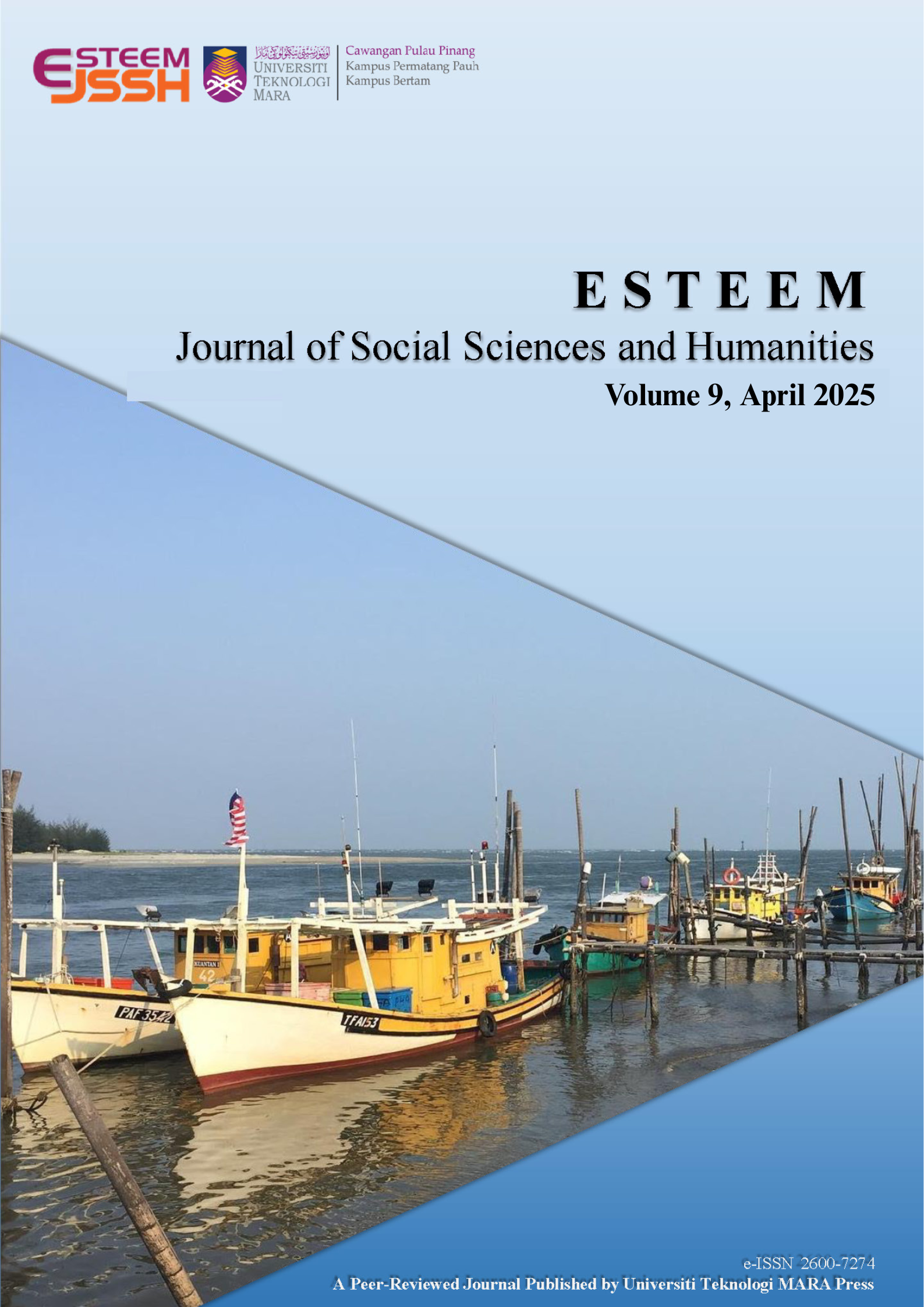
The impact of entrepreneurship education on university students' entrepreneurial intention: A study at UiTM Cawangan Pulau Pinang
Nurfarahin Nabila Fauzi
Faculty of Hotel & Tourism Management, Universiti Teknologi MARA Cawangan Pulau Pinang, 13500 Pulau Pinang, Malaysia
Joesri Mohamad Saber
Faculty of Hotel & Tourism Management, Universiti Teknologi MARA Cawangan Pulau Pinang, 13500 Pulau Pinang, Malaysia
Azlan Salim
Faculty of Hotel & Tourism Management, Universiti Teknologi MARA Cawangan Pulau Pinang, 13500 Pulau Pinang, Malaysia
Mohd Zool Fadli Ibrahim
Faculty of Hotel & Tourism Management, Universiti Teknologi MARA Cawangan Pulau Pinang, 13500 Pulau Pinang, Malaysia
Khairil Anuar Bahari
Faculty of Hotel & Tourism Management, Universiti Teknologi MARA Cawangan Pulau Pinang, 13500 Pulau Pinang, Malaysia
Abstract
Entrepreneurship education has been recognized/recognised as critical in shaping students' entrepreneurial mindset and career intentions. Despite various initiatives to embed entrepreneurship into higher education curricula, many university graduates still lack the confidence and motivation to venture into entrepreneurship, opting for traditional employment pathways. This lack of confidence and preference for traditional employment raises concerns about the effectiveness of entrepreneurship education in fostering actual entrepreneurial outcomes among students. Thus, this study aims to examine the impact of entrepreneurship education on students' entrepreneurial intention, focusing on key factors such as perceived feasibility, propensity to act, and attitude towards entrepreneurship. 275 students from UiTM Cawangan Pulau Pinang participated in this study. The results indicate a strong positive correlation between entrepreneurship education and students' entrepreneurial intention. Findings show that students who undergo structured entrepreneurship training are 25% more likely to pursue entrepreneurship than those with minimal exposure. Additionally, perceived feasibility and propensity to act emerged as the strongest predictors of entrepreneurial intention, emphasizing / emphasising the role of self-efficacy and confidence in business decision-making. However, this study is limited by its sample size and geographical scope, which may affect generalizability / However, the sample size and geographical scope of this study limit its generalisability. Future research should explore longitudinal studies to assess the long-term effects of entrepreneurship education on graduates' entrepreneurial success. These findings provide valuable insights for universities and policymakers in designing more effective entrepreneurship programs to nurture future entrepreneurs and contribute to the national economic landscape.
Keywords:Entrepreneur Education, Perceived Desirability,Propensity to Act, Perceived Feasibility, Entrepreneurial Intention
DOI: ejssh.v9i1.5681
References:
Al-Qadasi, N., Zhang, G., & Al-Jubari, I. (2021). Attitude of youth towards self-employment: evidence from university students in Yemen. Plos One, 16(9), e0257358. https://doi.org/10.1371/journal.pone.0257358
Aloulou, W. J. (2022). The influence of institutional context on entrepreneurial intention: evidence from the Saudi young community. Journal of Enterprising Communities: People and Places in the Global Economy, 16(5), 677–698. https://doi.org/10.1108/JEC-02-2021-0019
Anwar, I., & Saleem, I. (2019). Exploring entrepreneurial characteristics among university students: an evidence from India. Asia Pacific Journal of Innovation and Entrepreneurship, 13(3), 282–295. https://doi.org/10.1108/APJIE-07-2018-0044
Astiana, M., Malinda, M., Nurbasari, A., & Margaretha*, M. (2022). Entrepreneurship Education Increases Entrepreneurial Intention Among Undergraduate Students. European Journal of Educational Research, 11(2), 995–1008. https://doi.org/10.12973/eu-jer.11.2.995
Bui, T. H. V., Nguyen, T. L. T., Tran, M. D., & Nguyen, T. A. T. (2020). Determinants Influencing Entrepreneurial Intention among Undergraduates in Universities of Vietnam. The Journal of Asian Finance, Economics and Business, 7(7), 369–378. https://doi.org/10.13106/jafeb.2020.vol7.no7.369
Cater, J. (2021). Drivers of entrepreneurial intentions in the context of the covid-19 pandemic. Journal of Higher Education Theory and Practice, 21(11). https://doi.org/10.33423/jhetp.v21i11.4670
Cater, J., Young, M., Al‐Shammari, M., & James, K. (2021). Re-exploring entrepreneurial intentions and personality attributes during a pandemic. Journal of International Education in Business, 15(2), 311-330. https://doi.org/10.1108/jieb-04-2021-0050
Chukhray, N., Greguš, M., Karyy, О., & Halkiv, L. (2021). Formation of the entrepreneurial potential of student youth: a factor of work experience. Mathematics, 9(13), 1494. https://doi.org/10.3390/math9131494
Dao, T. K., Bui, A. T., Doan, T. T. T., Dao, N. T., Le, H. H., & Le, T. T. H. (2021). Impact of academic majors on entrepreneurial intentions of Vietnamese students: An extension of the theory of planned behavior. Heliyon, 7(3), e06381. https://doi.org/10.1016/j.heliyon.2021.e06381
Duong, C. (2023). A moderated mediation model of perceived barriers, entrepreneurial self-efficacy, intentions, and behaviors: a social cognitive career theory perspective. Oeconomia Copernicana, 14(1), 355-388. https://doi.org/10.24136/oc.2023.010
Esfandiar, K., Sharifi-Tehrani, M., Pratt, S., & Altinay, L. (2019). Understanding entrepreneurial intentions: A developed integrated structural model approach. Journal of Business Research, 94, 172–182. https://doi.org/10.1016/j.jbusres.2017.10.045
Fong, C. W., Yen, Y. Y., & Ramasamy, S. (2023). Sustainable entrepreneurship in Malaysian companies. Asian Economic and Financial Review, 13(2), 98–107. https://doi.org/10.55493/5002.v13i2.4708
Ginanjar, A. (2016). Entrepreneurship Education and Entrepreneurial Intention on Entrepreneurship Behavior: a Case Study. Proceedings of the 2016 Global Conference on Business, Management and Entrepreneurship. https://doi.org/10.2991/gcbme-16.2016.129
Goryushkina, N., Voinova, N., Voronkova, O., Sitnov, A., Shichiyakh, R., & Gordeyeva, O. (2019). Theoretical aspects of entrepreneurial education for hospitality industry. Journal of Environmental Management and Tourism, 10(4), 835. https://doi.org/10.14505//jemt.10.4(36).14
Haron, H., Saa'din, I., Ithnin, H., & Rakiman, U. (2022). Entrepreneurial intention among non-business students: the role of entrepreneurship education, interest and university support. International Journal of Academic Research in Business and Social Sciences, 12(10). https://doi.org/10.6007/ijarbss/v12-i10/14932
He, W. (2023). Rural development and entrepreneurship: exploration of entrepreneurial intention in rural area among Chinese university students. Sage Open, 13(3). https://doi.org/10.1177/21582440231198811
Hou, M., Liu, D., Wu, A., & Yan, Z. (2017). Will entrepreneurial intention directly lead to entrepreneurial behaviour?: a study based on the intermediary effect of entrepreneurial implementation plan. Proceedings of the Second International Conference On Economic and Business Management (FEBM 2017). https://doi.org/10.2991/febm-17.2017.12
Jabar, S. B. H. A., Jabar, M. B. H. A., Isahak, S. N. B., & Samsudin, A. R. B. (2021). Intention to become an entrepreneur among business students: Case study in UiTM Segamat, Johor. Insight Journal, 8, 1-12. https://doi.org/10.24191/ij.v8i0.108
Jin, D., Liu, X., Zhang, F., & Wen, Z. (2023). Entrepreneurial role models and college students’ entrepreneurial calling: a moderated mediation model. Frontiers in Psychology, 14. https://doi.org/10.3389/fpsyg.2023.1129495
Khayru, R., Nichen, N., Chairunnas, A., Safaruddin, S., & Tahir, M. (2021). Study on The Relationship Between Social Support and Entrepreneurship Intention Experienced by Adolescents. Journal of Social Science Studies (JOS3). https://doi.org/10.56348/jos3.v1i2.14.
Krueger, N. (1993). The Impact of Prior Entrepreneurial Exposure on Perceptions of New Venture Feasibility and Desirability. Entrepreneurship Theory and Practice, 18(1), 5–21. https://doi.org/10.1177/104225879301800101
Lu, G., Song, Y., & Pan, B. (2021). How University Entrepreneurship Support Affects College Students’ Entrepreneurial Intentions: An Empirical Analysis from China. Sustainability, 13(6), 3224. https://doi.org/10.3390/su13063224
Malebana, M. and Swanepoel, E. (2019). The relationship between exposure to entrepreneurship education and entrepreneurial self-efficacy. Southern African Business Review, 18(1), 1-26. https://doi.org/10.25159/1998-8125/5630
MASMED UiTM - Malaysian Academy of SME & Entrepreneurship Development (MASMED) Universiti Teknologi MARA - Overview. [online] Available at: https://masmed.uitm.edu.my/index.php/research-training/overview
Mejjah, O., Ngulyavyangu, H., Peter, T., & Mwita, S. (2021). Assessment of entrepreneurial traits and intention among undergraduate students at catholic university of health and allied sciences -mwanza, tanzania. Asian Journal of Business and Management, 9(5). https://doi.org/10.24203/ajbm.v9i5.6808
Meoli, A., Fini, R., Sobrero, M., & Wiklund, J. (2020). How entrepreneurial intentions influence entrepreneurial career choices: the moderating influence of social context. Journal of Business Venturing, 35(3), 105982. https://doi.org/10.1016/j.jbusvent.2019.105982
Misoska, A., Dimitrova, M., & Mrsik, J. (2016). Drivers of entrepreneurial intentions among business students in macedonia. Economic Research-Ekonomska Istraživanja, 29(1), 1062-1074. https://doi.org/10.1080/1331677x.2016.1211956
Mohamed Fadzil, N. A. F., Mohd Fuza, Z. I., Wan Kamarudin, W. N. B., & Nik Mohd Fahmi, N. M. Z. (2022). Environmental factors and the entrepreneurial intentions of UiTM hospitality students. Journal of International Business, Economics and Entrepreneurship, 7(2), 45. https://doi.org/10.24191/jibe.v7i2.20714
Murugesan, R. and Jayavelu, R. (2015). Testing the impact of entrepreneurship education on business, engineering and arts and science students using the theory of planned behaviour. Journal of Entrepreneurship in Emerging Economies, 7(3), 256-275. https://doi.org/10.1108/jeee-12-2014-0053
Nepal, B., Silwal, Y., Adhikari, R., Upadhyay, S., & Luitel, C. (2021). Role of school level curriculum toward development of entrepreneurial intention of student: a cross sectional study in Bagmati province, Nepal. Shanlax International Journal of Management, 8(4), 1-16. https://doi.org/10.34293/management.v8i4.3729
Nsahlai, V. K., Zogli, L. J., Lawa, E., & Dlamini, B. I. (2020). Factors influencing entrepreneurial intention: A case of students in a South African University. Academy of Entrepreneurship Journal, 26(1), 1–10.
Nguyen, T., & Phan, H. (2024). Entrepreneurship environments and entrepreneurial intention- the role of self efficacy and role model. International Journal of Engineering Business Management. https://doi.org/10.1177/18479790241275925.
Otache, I., Umar, K., Audu, Y., & Onalo, U. (2021). The effects of entrepreneurship education on students’ entrepreneurial intentions. Education + Training, 63(7/8), 967–991. https://doi.org/10.1108/ET-01-2019-0005
Othman, N. H., Othman, N., & Juhdi, N. H. (2020). The impact of entrepreneurship education on university students' entrepreneurial intention: A study at UiTM Cawangan Pulau Pinang. Jurnal Cakrawala Pendidikan, 39(2), 370–381. https://doi.org/10.21831/cp.v39i2.30102
Ozaralli, N., & Rivenburgh, N. K. (2016). Entrepreneurial intention: antecedents to entrepreneurial behavior in the U.S.A. and Turkey. Journal of Global Entrepreneurship Research, 6(1), 3. https://doi.org/10.1186/s40497-016-0047-x
Paray, Z. and Kumar, S. (2020). Does entrepreneurship education influence entrepreneurial intention among students in hei’s?. Journal of International Education in Business, 13(1), 55-72. https://doi.org/10.1108/jieb-02-2019-0009
Pauceanu, A., Alpenidze, O., Edu, T., & Zaharia, R. (2018). What Determinants Influence Students to Start Their Own Business? Empirical Evidence from United Arab Emirates Universities. Sustainability, 11(1), 92. https://doi.org/10.3390/su11010092
Pratama, A. and Sartika, N. (2018). Entrepreneur intention among college student in riau province. Inovbiz Jurnal Inovasi Bisnis, 6(2), 106. https://doi.org/10.35314/inovbiz.v6i2.821
Patrick, Z., Rizal, A., Hee, O., Mahadi, M., & Kamarudin, S. (2019). Factors hindering undergraduate students from starting a business while studying. International Journal of Academic Research in Business and Social Sciences, 9(1). https://doi.org/10.6007/ijarbss/v9-i1/5421
Ranga, V., Jain, S., & Venkateswarlu, P. (2019). Exploration of Entrepreneurial Intentions of Management Students Using Shapero’s Model. Theoretical Economics Letters, 09(04), 959–972. https://doi.org/10.4236/tel.2019.94062
Romero-Galisteo, R.-P., González-Sánchez, M., Gálvez-Ruiz, P., Palomo-Carrión, R., Casuso-Holgado, M. J., & Pinero-Pinto, E. (2022). Entrepreneurial intention, expectations of success and self-efficacy in undergraduate students of health sciences. BMC Medical Education, 22(1), 679. https://doi.org/10.1186/s12909-022-03731-x
Ruiz‐Palomino, P., & Martínez-Cañas, R. (2021). From opportunity recognition to the start-up phase: the moderating role of family and friends-based entrepreneurial social networks. International Entrepreneurship and Management Journal, 1-24. https://doi.org/10.1007/s11365-020-00734-2.
Saraswati, T. T., Indrawati, A., & Wardana, L. W. (2021). Do Entrepreneurial Mindset and Perceived Behavioural Control Matter Entrepreneurial Intention? Jurnal Pendidikan Ekonomi Dan Bisnis (JPEB), 9(2), 131–145. https://doi.org/10.21009/JPEB.009.2.5
Shapero, A., & Sokol, L. (1982). The Social Dimensions of Entrepreneurship. In Encyclopedia of Entrepreneurship (pp. 72–90). Prentice-Hall Inc.
Shirokova, G., Osiyevskyy, O., & Bogatyreva, K. (2016). Exploring the intention–behavior link in student entrepreneurship: Moderating effects of individual and environmental characteristics. European Management Journal, 34(4), 386–399. https://doi.org/10.1016/j.emj.2015.12.007
Sukron Djazilan, M., & Darmawan, D. (2022). Entrepreneurship education and family support: The determinants that appear entrepreneurship interest for students. International Journal of Service Science, 1(2), 26–30.
Sulistyorini, Y., & Santoso, B. (2021). Entrepreneurial Knowledge on Entrepreneurial Intention: The Mediating of Perceived Desirability and Perceived Feasibility. BASKARA : Journal of Business and Entrepreneurship, 3(2), 93–101. https://doi.org/10.54268/baskara.3.2.93-101
Tan, L. P., Pham, L. X., & Bui, T. T. (2021). Personality Traits and Social Entrepreneurial Intention: The Mediating Effect of Perceived Desirability and Perceived Feasibility. The Journal of Entrepreneurship, 30(1), 56–80. https://doi.org/10.1177/0971355720974811
Wasilczuk, J., Chukhray, N., Karyy, O., & Halkiv, L. (2021). Entrepreneurial competencies and intentions among students of technical universities. Problems and Perspectives in Management, 19(3), 10-21. https://doi.org/10.21511/ppm.19(3).2021.02



